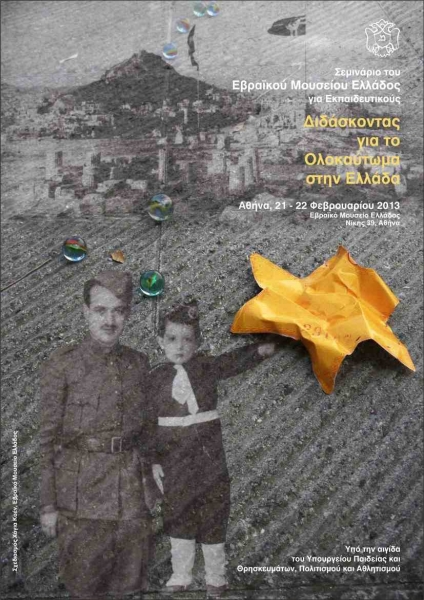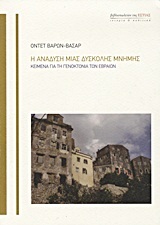- The second edition of your book The Emergence of a Difficult Memory: Essays on the Jewish Genocide is about to be released. What brings together the nineteen essays in it, what is their connecting link and main thematic circle?
- Maybe the keywords are memory and oblivion. The memory of the genocide of the Jews gives rise to more heated discussions, a variety of approaches to the topic and disputes. Faced with the traumatic fact of the genocide of the Jews planned by the Nazis and carried out by them and their collaborators in civilized and Christian Europe in the heart of the twentieth century, from 1942 to 1945, historians, sociologists, politicians and scientists express their position and interpret in different ways issues that have been "unmentionable, unthinkable" for decades. It is clear that a multidisciplinary approach to this phenomenon is required today more than ever.
Memory and oblivion as regards the collectively experienced traumatic events have their own dialectic. Making the memory of the extermination of the Jews resurface, breaking the silence about the horrific events proves to be a difficult process, not only in Greece but also in the international historiography and the testimonies of survivors. I examine how their silence, from a certain point onwards, has crystallized in memory which, instead of fading away, reverses, becoming increasingly clearer. It does not gush out easily or fade away over time. The memory of this genocide, which seemed to have been forgotten for decades, is painfully re-emerging and being cultivated, and it is fighting in order to impose itself, something that it was able to achieve on the international horizon in the 1980s. The inclusion of this memory and its historicizing was not implied for any society or scientific community. I also analyze the first oral and written evidence of survivors of concentration camps in Europe as well as the place of Greece in the geography of belated resurgence of memory.
- The historiography of the genocide raises two main issues relating to the sources and objectivity.
 - Let's start with the sources. Where could the sources on which a historian could rely to write the history of these events be? Could they be in the documents and records that the Nazis themselves had taken care to destroy? Along with the Jews, the aim was the elimination of all traces. Any written evidence of the destruction, elimination of the witnesses was provided by the system and the only permitted means of exit was "the chimney". All this was an important concern of the Nazi leadership in relation to the final solution to the “Jewish Question”. If some of the camps fell partly intact into the hands of the Allies it was only because the perpetrators had failed to eliminate the traces (in Auschwitz they destroyed the crematoria and the gas chambers at a feverish pace before emptying the camp of its prisoners, those anyway who were still able to walk in the "death march"). We should not forget that the intention of the Nazis was to run concentration camps on an industrial scale, their raw material being men, women and children, their product ash and by-product smoke. No living witnesses should have remained. Moreover, the information left by the perpetrators in surviving records is of a completely different kind, of bureaucratic nature. Contrary to their plans, fortunately, there are survivors. There was no other way than for the survivors to speak out and for historians to find a way to comprehend the enormity of what they were hearing.
- Let's start with the sources. Where could the sources on which a historian could rely to write the history of these events be? Could they be in the documents and records that the Nazis themselves had taken care to destroy? Along with the Jews, the aim was the elimination of all traces. Any written evidence of the destruction, elimination of the witnesses was provided by the system and the only permitted means of exit was "the chimney". All this was an important concern of the Nazi leadership in relation to the final solution to the “Jewish Question”. If some of the camps fell partly intact into the hands of the Allies it was only because the perpetrators had failed to eliminate the traces (in Auschwitz they destroyed the crematoria and the gas chambers at a feverish pace before emptying the camp of its prisoners, those anyway who were still able to walk in the "death march"). We should not forget that the intention of the Nazis was to run concentration camps on an industrial scale, their raw material being men, women and children, their product ash and by-product smoke. No living witnesses should have remained. Moreover, the information left by the perpetrators in surviving records is of a completely different kind, of bureaucratic nature. Contrary to their plans, fortunately, there are survivors. There was no other way than for the survivors to speak out and for historians to find a way to comprehend the enormity of what they were hearing.
- A particular importance during these events is attached to Thessaloniki, as the largest Jewish community that lived in Greece was deported from there. You examine the coverage of these events in the oral testimonies and stories of survivors as well as in historiography and literature.
- The biggest crime against the citizens of Thessaloniki was committed in 1943 by the Nazi occupiers of the city. Only the first act of the drama took place in the city itself, namely the bringing together of Thessaloniki Jews in a ghetto to facilitate their deportation to the death camps. The second and final act, the implementation of the "final solution" intended by the Nazis happened in the camps set up in Poland, and especially in Auschwitz-Birkenau. However, one of the main reasons for the Germans to refuse to cede Thessaloniki to their Italian allies was its numerous and significant Jewish community which was their prime objective. It was an evil irony of fate that in a city where there had never been ghettos, they were created just for the deportation of its inhabitants. In his book Salonica, City of Ghosts. Christians, Muslims and Jews, 1430-1950, historian Mark Mazower notes that the third ghetto, that of Baron Hirsch, which had one exit straight to the railway station, was established in the late nineteenth century as a settlement to accommodate and shelter Ashkenazi Jewish refugees, survivors of the pogroms in Tsarist Russia.
 - Seven of the texts in your book treat the issue of the deportation and extermination of Greek Jews. Your essay "The deportation of Jews from Thessaloniki: a crime without a trace?" uses as a motto verses by famous Greek poet of the first post-war generation, Manolis Anagnostakis, "All those human figures becoming again numbers/How am I to explain more plainly who were Ilias, Raoul, Claire, and how so many personalities became numbers?"
- Seven of the texts in your book treat the issue of the deportation and extermination of Greek Jews. Your essay "The deportation of Jews from Thessaloniki: a crime without a trace?" uses as a motto verses by famous Greek poet of the first post-war generation, Manolis Anagnostakis, "All those human figures becoming again numbers/How am I to explain more plainly who were Ilias, Raoul, Claire, and how so many personalities became numbers?"